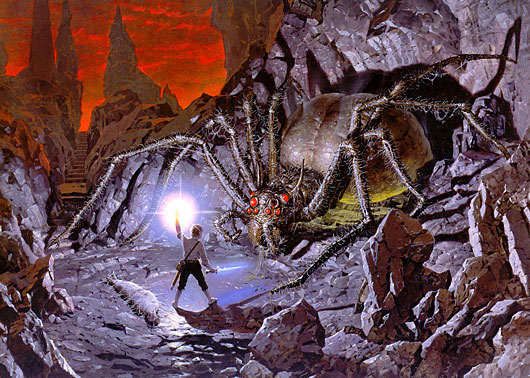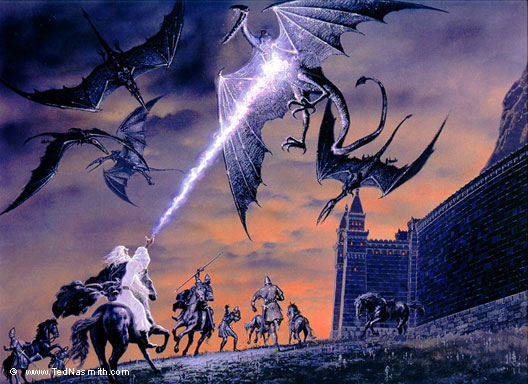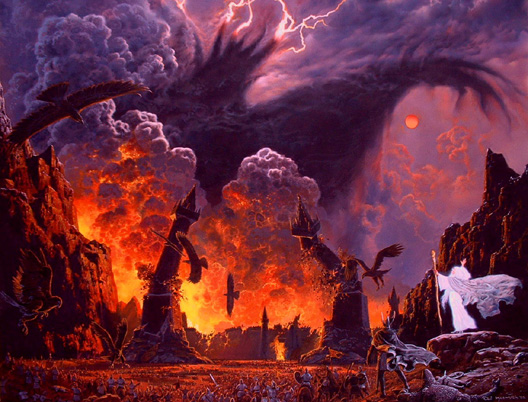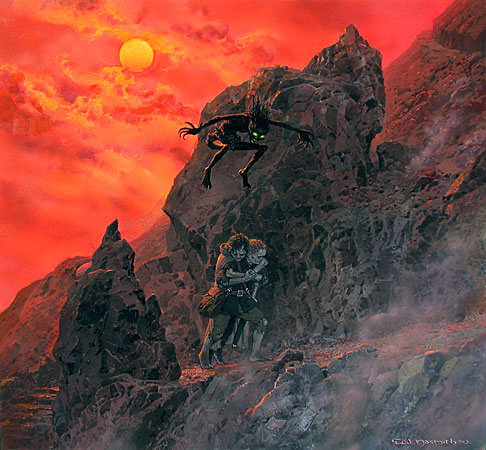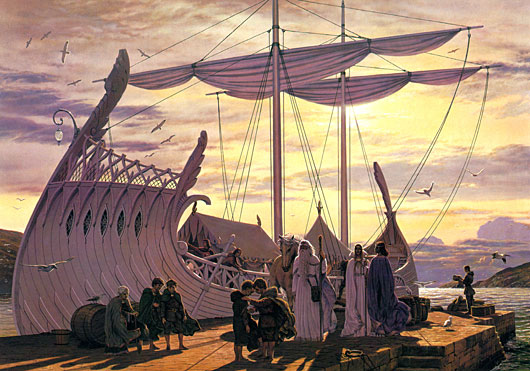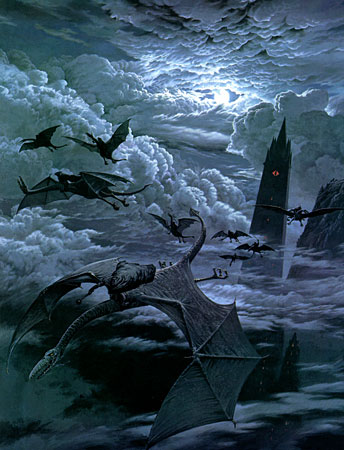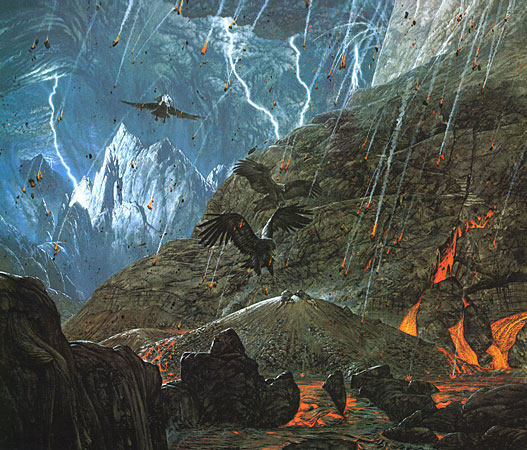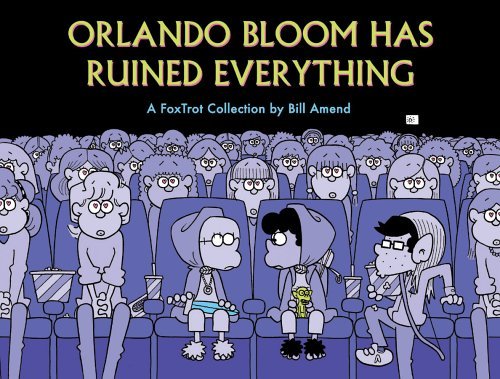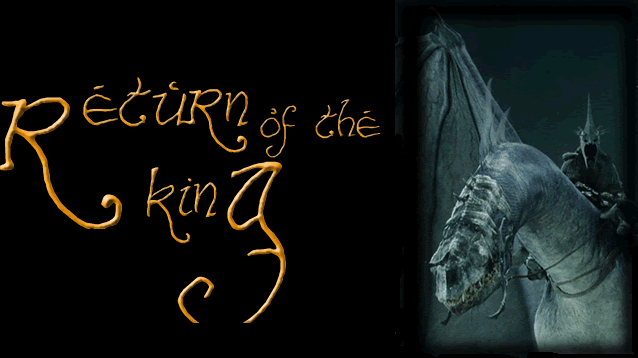
Major Themes
- The Ambiguity of Evil - What makes evil? At the beginning of The Lord of the Rings, we see that the bad guys are ugly, wear all black, and are pure evil for just the sake of evil. they tear down trees, they want to eat people, they kick their own mothers (well... not actually shown, but I'm sure that they would have)! Saruman is the only deviation here, and even he lives in an all black tower. The good guys, however, are pretty much all good. Yeah, the elves are sissies, the elves and dwarves hate each other, the hobbits are lazy and fat, but outside of that, they are easily recognizable as "good." The only exception here is Boromir, but as we have seen, he is influenced by evil and not truly evil himself. By the time we get to The Two Towers, the lines begin to blur. Men fight on both sides. Faramir reminds us that the "bad guys" they are killing are just people like them. Faults in our heroes begin to show. Gollum is a trickster - not really good nor bad. In The Return of the King, we want to look for more examples of this line blurring.
- The Importance of Friendship - Obviously, look to Frodo and Sam for true friendship. This is where some say that Sam becomes the true hero of this story (more so in the book than movie). Merry and Pippin's friendship also takes a larger role in the story. Legolas and Gimli continue their anti-racism lesson by showing that if they can get along, why can the rest of us?
- The Importance of Redemption - This is not just forgiveness, but closer to forgiveness that you have earned. Boromir is redeemed by giving his life for the two hobbits. There are many more in this story that need redemption. Aragorn needs redemption for dodging his responsibilities all these years. Boromir's father needs redemption. Frodo needs redemption. Many need redemption here, not all get it.
Christian Symbolism
In class handouts:
Other class handouts involve Chapter 10 from Book 4 of The Two Towers and Chapter 8 from Book 6 of The Return of the King. If you cannot get those from me, check out the books from the library.
The Predictions/Visions In the Story
"Nothing is certain." - Elrond, head sissy elf of Rivendale.
Galadriel (mirror and her own visions):
- The Shire will fall to orcs and factories will pollute the countryside.
- Boromir will try to take the ring (fulfilled).
- Each member of the fellowship will try to take the ring (Frodo tries to circumvent this by leaving the fellowship, but does take one member with him).
- The Fellowship will fail (fulfilled).
- Frodo will die.
Elrond:
- Aragorn may become king, but if Arwen stays she will live a long life after his death and be all alone
- Aragorn and Arwen will have a baby boy (also seen by Arwen)
Saruman:
- Sauron will win and Gandalf and his group will die.
- Frodo will die and Sauron will get the ring back.
Boromir (under influence of the ring):
- Frodo will take the ring for himself
Gandalf:
- Lord Denethor will realize that he loves Faramir in the end.
- Sauron does not believe that anyone would attempt to destroy the ring.
Pippin:
- Lord Denethor will realize his love for Faramir.
Gollum:
- Sam will try the take the ring.
Theoden:
- We will not be able to win the war at Mordor.
Narsil
Also known as the Sword of Elendil. It is very old (First Age). This is the sword that was used in the flashback scene in the first movie that cut the ring from Sauron's hand. It was broken in that battle and has been an heirloom of Isildur's heirs (Isildur being the guy who cut the ring off Sauron's hand. Aragorn brought it to Rivendale. It was reforged by Elrond on Arwen's request and given to Aragorn before he goes to war against Mordor. It is renamed Andúril when it is reforged.
Want more on Narsil? Click here.
Other famous swords in myth, history, and story:
Excalibur - the famous sword of kings that Arthur pulled out of the anvil (not a stone, but the anvil was on a stone and the sword went through both) or was given to Arthur by the Lady fo the Lake. The bearer of Excalinur cannot be harmed. The scabbard was worth many times more than the sword in monetary value.
Gram - Belonged to Sigurd's father and shattered. Sigurd reforged it and used it to slay a dragon.
Curtana - "Sword of Mercy" used by Edward the Confessor. It had no sharp point.
Crocea Mors - "Yellow Death" used by Julius Ceasar. It was made of gold.
Balmung - used by St. George to slay the dragon. It was said to have been forged by Wieland the Smith (Norse blacksmith for the gods).
Nagling - used by Beowulf. Failed him only once, in Beowulf's death by the dragon. Also forged by Weiland Smith.
Orna - used by Ogma, Celtic god of scholars and runes. He took it from the Fororians.
Fragarach - used by Lugh, Celtic god of the sky or light, Cu Culainn's father. It could cut through any armor.
Kusanagi - "Sword of Black Clouds in the Sky" used by Ninigi (Japanese warrior). It symbolized courage.
The below pictures are from an artist named Ted Nasmith. Clicking on a picture will take you to his web site where you will see that image larger.
Click to see larger
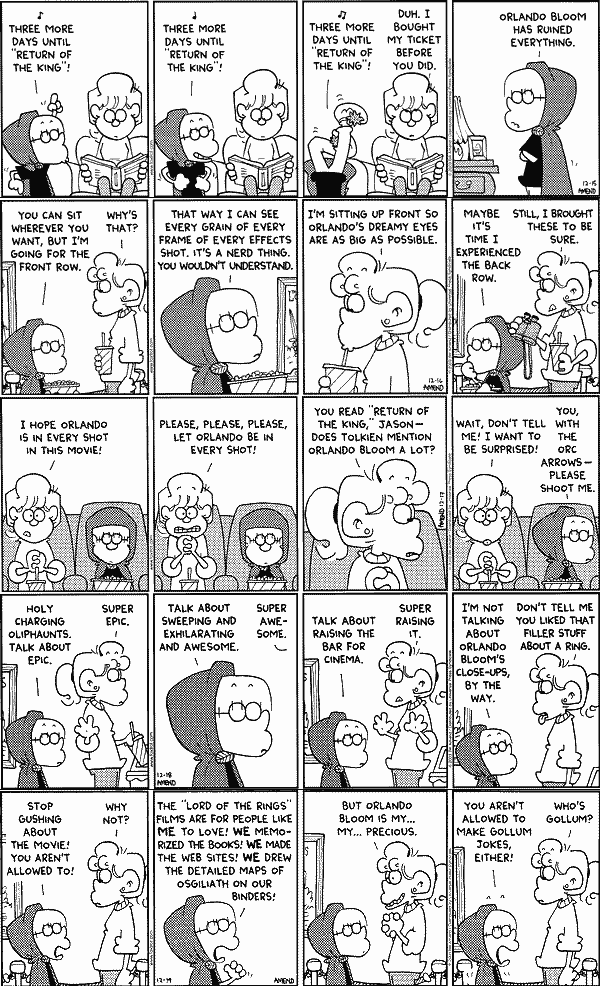
Links
The Extra Credit on the test is:
What is the name of Sigurd's sword that was shattered and reforged?
